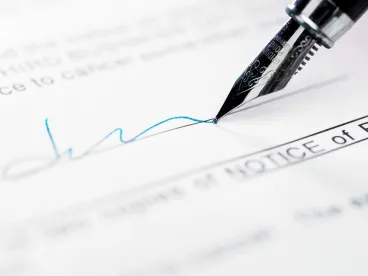Sometimes a crisis can be an opportunity to embrace new technologies and changes that were already on the horizon – albeit at a much more expedited pace. As employees are required to work remotely and practice social distancing due to the COVID-19 pandemic, the federal government and several state governments (including New York and New Jersey) are moving (New York more quickly than New Jersey) to enable remote online notarization and keep businesses operating.
A Potential Federal Solution
On March 18, 2020, Senator Kevin Kramer, R-N.D. and Mark Warner, D-Va, introduced legislation that would allow immediate nationwide use of remote online notarization in response to the Covid-19 outbreak. Senate Bill 3533, the Securing and Enabling Commerce Using Remote and Electronic Notarization Act of 2020 (the “SECURE Act”) was introduced as bipartisan legislation to authorize and establish minimum standards for electronic and remote notarizations that occur in or affect interstate commerce. If the SECURE Act becomes law, it will authorize every notary in the US to perform remote on-line notarizations using audio-visual communications and tamper-evident technology in electronic notifications and provide fraud prevention through use of multifactor authentication.
Currently, only twenty-three states allow notaries to conduct remote notarizations: Arizona, Florida, Idaho, Indiana, Iowa, Kentucky, Maryland, Michigan, Minnesota, Montana, Nebraska, Nevada, North Dakota, Ohio, Oklahoma, South Dakota, Tennessee, Texas, Utah, Vermont, Virginia, Washington and Wisconsin.
Until the Covid-19 outbreak forced non-essential businesses to close and employees to work from home, neither New York nor New Jersey permitted remote on-line notarization of documents.
New York Moves Swiftly To Allow Remote Notarizations Through April 18, 2020
New York Governor Andrew Cuomo issued an executive order allowing notarizations using audio-video technology in place of physical appearance under certain conditions. This option allows New York Notaries and signers to practice the necessary “social distancing” required to reduce risk of contracting COVID-19. The order is in effect through April 18, 2020.
To use audiovisual technology to communicate during the notarization, the Notary and signer must comply with the following requirements:
-
The person seeking the Notary’s services, if not personally known to the Notary, must present valid photo ID to the Notary during the video conference. The signer may not present ID prior to or after the notarization.
-
The video conference must allow for direct interaction between the person and the Notary (e.g. no pre-recorded videos of the person signing).
-
The person must affirmatively represent that he or she is physically located in the State of New York.
-
The person must transmit by fax or electronic means a legible copy of the signed document directly to the Notary on the same date it was signed.
-
The Notary may notarize the transmitted copy of the document and transmit the same back to the person.
-
The Notary may repeat the notarization of the original signed document as of the date of execution provided the Notary receives such original signed document together with the electronically notarized copy within thirty days after the date of execution.
New Jersey Is On The Right Track, But Moving Too Slowly
On March 19, 2020, the New Jersey Legislature passed bill A-3864 https://www.njleg.state.nj.us/2020/Bills/A4000/3864_I1.HTM which awaits signature by Governor Murphy and will allow remote notarization. However, once signed by the Governor, the bill does not take effect for 90 days. In addition, the New Jersey law does not apply to wills or family law matters (divorce, adoption, etc.).
Until Bill 3864 is signed by Governor Murphy and becomes effective, notaries in New Jersey have been instructed to perform “window-separated signings”. This means that the Notary and signor must be able to communicate with each other by sight and sound through the window and by normal means. Cell phones, FaceTime, Skype, Zoom or any other electronic communication tools may not be used for a “window-separated signing.” The Notary must follow all federal, state and local guidelines for social distancing, health protection and sanitization when meeting with signers and handling documents, IDs or other materials. As Covid-19 continues to tear through New Jersey and the United States as a whole, “window-separated signings” is not a practical solution and provides little comfort to notaries and signers alike.
While the US as a whole has been moving towards remote notarization for years, state by state, this crisis could be the impetus for a national resolution.



 />i
/>i

